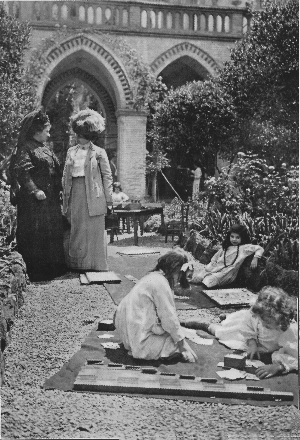
Maria Montessori presents a critical consideration of the “New Pedagogy” (1912) by discussing the advent and implementation of the “scientific pedagogy” that took root in Italy around the turn of the 20th century. Montessori’s critique focuses on the shortcomings of scientific pedagogy to address the human subjects (and observers) involved in the study of teaching and learning.
In establishing her critique, Montessori finds fault with an overemphasis on the instrumentalization of pedagogy which comes at the expense of a more authentic manifestation of the spirit of learning. This spirit of learning is connected throughout her argument as part of the same pursuit of knowledge that has sustained human progress since the beginning of civilization. She cites examples of rigid student desks and behaviourist means of doling out rewards and punishments as elements of “scientific pedagogy” that run counter to the spirit of discovery that is central to learning.
For a new pedagogy to emerge within this context, Montessori argues that teachers ought to be prepared to engage the act of teaching as one oriented toward “a conquest of liberty” that provides an education in which pupils are seen as future agents of human regeneration. To this end, she proposes educationists elevate the study of pedagogy to that of its own scientific exploration: part of the larger narrative of human progress that is embedded within the histories of science, technology, and the broader humanities, and yet informed by its own unique contexts and possibilities.
Montessori, Maria George, Anne E. (Trans), (1912). The Montessori method: Scientific pedagogy as applied child education in “The Children’s Houses”, with additions and revisions by the author. , (pp. 1-27). New york, NY, US: Frederick A Stokes Company, xlii, 377 pp. doi: 10.1037/13054-001